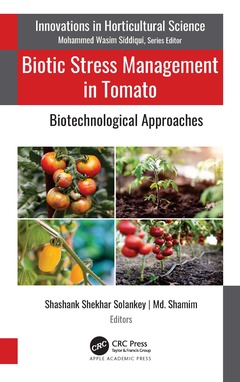Biotic Stress Management in Tomato Biotechnological Approaches Innovations in Horticultural Science Series
Coordonnateurs : Solankey Shashank Shekhar, Shamim Md.

This valuable volumehighlights biotechnological tools and their utilization for biotic stress management in the tomato plant, one of the world?s most important vegetable crops consumed by us in our daily diet and which is vulnerable to over 200 diseases as well as the impact of global climate change.
The chapters cover the major diseases of tomato along with practical biotic stress management strategies through biotechnological and molecular approaches. The focus is on molecular tools that can be used to prevent or mitigate damage from such diseases as bacterial wilt, bacterial canker, damping off seedlings, late blight, early blight, fusarium wilt, septorial leaf spot, cercospora leaf spot, verticilium wilt, tomato leaf curl virus, tobacco mosaic virus, tomato spotted wilt virus, root knot nematode, fruit borer, and sucking pests. Gene stacking/pyramiding and postharvest management strategies are also systematically discussed.
This book provides an up-to-date and comprehensive review that will be a greatly useful resource, containing basic facts and information on the new and recent discoveries for biotic stresses management of tomatoes.
1. Tomato Diseases, Their Impact, and Management 2. Molecular Tools for Bacterial Wilt Resistance in Tomato 3. Molecular Methods for the Controlling of Damping Off Seedlings in Tomato 4. Molecular Methods for the Controlling of Late Blight in Tomato 5. Molecular Approaches of Early Blight Resistance Breeding 6. Molecular Approaches for the Control of Septoria Leaf Spot in Tomato 7. Molecular Approaches for the Control of Cercospora Leaf Spot in Tomato 8. Molecular Approaches for the Control Tomato Leaf Curl Virus (TLCV) 9. Molecular Advances of the Tobacco Mosaic Virus Infecting Tomato 10. Molecular Approaches to Control the Root-Knot Nematode in Tomato 11. Molecular Approaches for the Control of Fruit Borer in Tomato 12. Molecular Approaches for Control of Sucking Pest in Tomato 13. Molecular Approaches for Multiple Genes Stacking/Pyramiding in Tomato for Major Biotic Stress Management 14. Molecular Approaches for the Postharvest Losses in Tomato by Different Biotic Stresses
Shashank Shekhar Solankey, PhD, is an Assistant Professor–cum–Jr. Scientist (Horticulture: Vegetable Science) at Dr. Kalam Agricultural College, Kishanganj under Bihar Agricultural University (BAU), Sabour (Bhagalpur), India. He has more than seven years of experience in teaching and research. He has previously worked as a Research Associate at ICAR-IIVR, Varanasi, India. His prime targeted area of research is biotic and abiotic stress resistance as well as quality improvement in vegetables, particularly, solanaceous crops and okra. Dr. Solankey has supervised several MSc students and has handled several research projects. Among his many national and international awards are a Best Teacher Award (2016) and Best Researcher Award (2016) by BAU. He has published over 50 research papers as well as review papers, a souvenir paper, books, an abstract book, over 35 book chapters, popular articles, etc. He is a life-time member of several societies and is an editorial board member and reviewer for many reputed journals. Dr. Solankey acquired a master’s degree in Vegetable Science from Acharya Narendra Deva University of Agriculture and Technology, Kumarganj, Ayodhya, India, and a doctorate in Horticulture from Banaras Hindu University, Varanasi, India.
Md. Shamim, PhD, is an Assistant Professor-cum-Scientist in the Department of Molecular Biology and Genetic Engineering at Dr. Kalam Agricultural College, Kishanganj (Bihar Agricultural University), India. He is the author or coauthor of over 30 peer-reviewed journal articles, over fifteen book chapters, and two conference papers. He has several authored and edited books to his credit along with several practical books. He is an editorial board member of several national and international journals. Recently, Dr. Shamim received the Young Faculty Award 2016 from the Venus International Foundation, Chennai, India. Before joining Bihar Agricultural University, Sabour. Dr. Shamim worked at the Indian Ag
Date de parution : 11-2021
15.2x22.9 cm
Disponible chez l'éditeur (délai d'approvisionnement : 14 jours).
Prix indicatif 171,15 €
Ajouter au panierThèmes de Biotic Stress Management in Tomato :
Mots-clés :
Tobacco Mosaic Virus; Tomato Leaf Curl Virus; PGPR; Bacterial Wilt; Late Blight; SLS; Cercospora Leaf Spot; DNA Marker; Inducing Systemic Resistance; Leaf Spot; Fusarium Wilt; Molecular Markers; Scar Marker; TMV RNA; Tuta Absoluta; Phytophthora Infestans; Solanum Habrochaites; Ralstonia Solanacearum; Beet Armyworm; AFLP Marker; Septoria Lycopersici; Tomato Fruit; Helicoverpa Armigera; Susceptible Tomato Cultivar; Cab International



